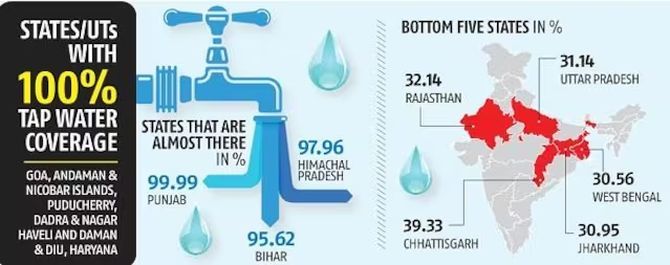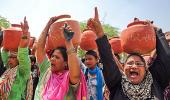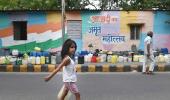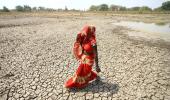'The first two years of the Jal Jeevan Mission were wasted in UP.'
'But after a push from the Centre, work has picked up pace in the state.'
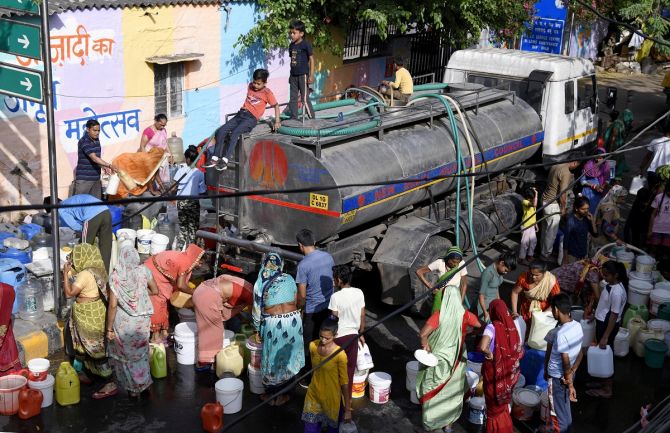
One of Prime Minister Narendra Modi's flagship programmes, the Jal Jeevan Mission, might not be able to achieve the target set for it of 100 per cent tap water coverage for households by 2024, but the government is confident that it will come close.
This would mean nearly doubling the current coverage of 57 per cent under the scheme, launched in 2019, to about 90 per cent by 2024.
Budgetary allocation has been raised by 27 per cent for financial year 2023-2024 to ensure that there is no delay in the programme due to paucity of funds.
For instance, if contractors do not get paid on time, then the pace of work suffers.
It has, however, not been an easy road for the ambitious scheme, with several challenges coming its way.
Many of the tenders had become economically unviable after the Russia-Ukraine war led to a rise in metal prices.
Government officials said they have tided over that crisis now, but state level difficulties remain.
States where the coverage is in the range of 50-75 per cent, the government says, will achieve saturation by 2024.
These include Ladakh, Maharashtra, Mizoram, Uttarakhand, Manipur, and Sikkim.
The bottom five states with coverage of less than 40 per cent include Uttar Pradesh, West Bengal, Rajasthan, Jharkhand, and Chhattisgarh.
Although Uttar Pradesh, officials said, started late on the programme, its tap water coverage went from 20 per cent of households last year to about 30 per cent, according to latest data.
"The first two years of the Jal Jeevan Mission were wasted in UP. But after a push from the Centre the work has picked up pace in the state," a government official said.
Despite implementation challenges, the government is hopeful that India's most populous state would be able to achieve up to 90 per cent coverage in a year, having processed and awarded a lot of projects already.
While UP has assured that it has adequate water supply, it is the opposite challenge in Rajasthan.
A government official said that because households in many areas in Rajasthan are far flung from the source of water, providing piped water connectivity has been difficult.
The desert state with 32 per cent tap water coverage is relying heavily on groundwater presently, a strategy not considered sustainable.
"Rajasthan's strategy is twofold -- take up groundwater recharge and shift the drinking water supply to surface water and tap into irrigation sources," the senior official said.
This means accessing the river Satluj towards the north, and the river Chambal in the south, in neighbouring Madhya Pradesh.
Even as Rajasthan struggles with supply, West Bengal seems to have a problem of plenty.
The state is also among the laggards in the Jal Jeevan Mission with coverage the same as UP -- about 31 per cent.
"While water supply is not an issue, we have to deal with the problem of contamination. So there the focus is a lot on treatment and supply," the senior official said.
West Bengal too was a late entrant to the scheme after it toyed with the idea of having its own programme for drinking water supply. But now it has dropped that idea. The team is good. West Bengal will also see a dramatic rise," the senior official added.
The Jal Jeevan Mission currently boasts of supplying 55 litres per capita per day of water to 57 per cent of rural households through functional taps.
It has a threshold of providing functional tap water connection to each house in habitation with at least 20 households.
Anything less than that and the responsibility falls on the state government.
Another important responsibility of states is to come up with operation and maintenance of these connections.
The Jal Shakti ministry has asked states to come up with a plan and decide on a mix of user charges and government subsidy for upkeep of the drinking water infrastructure.
"The decision on user charges has to be left to communities, panchayats. If we get into it now many might refuse a tap water connection. But in some time they may see value in paying a nominal charge for a tap facility," a government official said.
